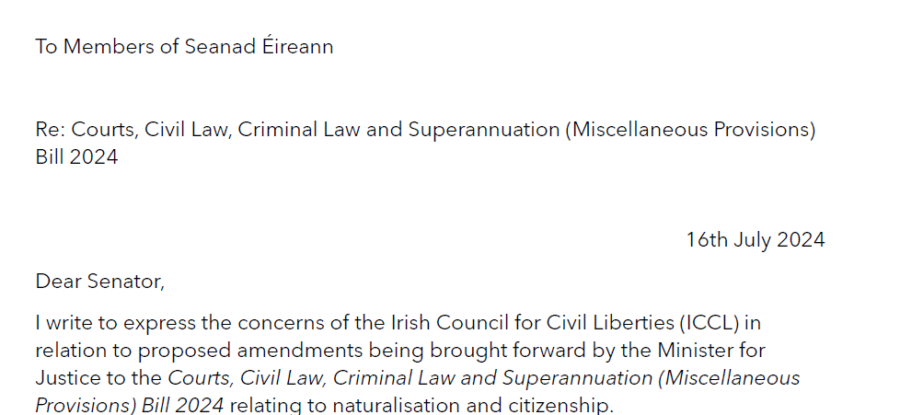16 July 2024
Today, ICCL wrote to Senators and the Minister for Justice outlining concerns on proposals to allow naturalised Irish citizens to have their citizenship revoked. Aside from creating a tiered form of citizenship, the way the proposal was introduced allowed no chance for scrutiny.
The concerns about the content of the proposals and the manner by which they were introduced are shared by our partners in the Irish Human Rights and Equality Commission (IHREC) and Immigration Ireland.
Legislation this sensitive and complex deserves proper scrutiny and should not be introduced by way of a Ministerial amendment at the very last opportunity to do so at the end of term. We urge Senators to reject this amendment and demand proper scrutiny of the proposals.

To Members of Seanad Éireann
Re: Courts, Civil Law, Criminal Law and Superannuation (Mscellaneous Provisions) Bill 2024
16th July 2024
Dear Senator,
I write to express the concerns of the Irish Council for Civil Liberties (ICCL) in relation to proposed amendments being brought forward by the Minister for Justice to the Courts, Civil Law, Criminal Law and Superannuation (Miscellaneous Provisions) Bill 2024 relating to naturalisation and citizenship.
As you will be aware, last week in the Dáil, the Minister brought forward amendments to this Bill at Committee Stage which would amend the Irish Naturalisation and Citizenship Act 1956 and would put in place a new procedure to revoke Irish citizenship, following from the Supreme Court decision in the case of Damache v Minister for Justice 2020 IESC 63.
Our concerns relate both to the process by which these far-reaching amendments are being proposed and the content of the proposal:
1. Amendments proposed at Committee Stage
As Deputy Brendan Howlin set out in detail during the Dáil debate on this Bill, the introduction of the proposed amendments at Committee Stage is particularly problematic. This means that there has been no pre-legislative scrutiny of the proposals and no second stage debate on the principles behind the Bill. Furthermore, members of the Dáil did not have adequate opportunity to propose amendments to the relevant sections in advance of the Committee Stage debate.
The issues raised are not merely technical in nature as the Bill proposes to introduce a new process for revoking Irish citizenship granted by way of naturalisation. Furthermore, given that the relevant Supreme Court ruling which this Bill seeks to address was issued in 2020, there is no particular urgency that might justify exceptional parliamentary treatment.
2. The proposed procedure for revocation
The core issue at stake in the Damache case was the insufficient independence from the Minister for Justice of the Review mechanisms whereby a person whose citizenship was revoked could have that decision reviewed. The Supreme Court ruled that any process to revoke citizenship required “high standards of natural justice”. The proposed replacement system retains a close link between the Minister and the new Committees of Inquiry, whereby the Minister will appoint such Committees, and prescribe relevant procedures. Aside from the discretion granted to the Minister, the time periods for the subject of a revocation order to challenge a decision are unusually short (28 days), and notably shorter than the corresponding periods for someone to challenge a decision if refused naturalisation. The notification process proposed by the Bill lacks strong safeguards to compel the State to take reasonable measures to ensure the subject is informed of such a decision. The proposed new process also allows procedural safeguards to be circumscribed by the Minister or a Committee of Inquiry if in “the interests of national security”.
When the various features of the proposed process are considered together, ICCL believes that there is reason to be concerned that the proposed process may once again fall short of the standards set by the Supreme Court.
3. Absence of safeguards against statelessness
Colleagues in the Immigrant Council of Ireland have drawn attention to the absence in the proposed process of any explicit safeguard against a person being made stateless as a consequence of a revocation of their Irish citizenship. This is despite Ireland having ratified the 1954 Convention relating to the Status of Stateless Persons and the 1961 Convention on the Reduction of Statelessness.
ICCL believes that the Oireachtas should at least have the opportunity to consider the implications of the proposed procedure, and whether it is in line with Ireland’s international obligations regarding the right to a nationality.
4. Concerns relating to existing grounds for revocation
Wider and more fundamental concerns relating to the grounds on which a person may be the subject of a revocation of citizenship (by revocation of a certificate of naturalisation) were not argued in the Damache case but
should, in our view, be considered by the Oireachtas when establishing a new procedure for revocation. Under the 1956 Act there are current five circumstances in which a certificate of naturalisation can be revoked:
a) where the certificate was obtained through fraud,
b) where the person has ‘failed in their duty of fidelity to the State’,
c) where a person has failed to meet necessary residency requirements for their citizenship,
d) where the citizen is also a citizen of a country with which Ireland is at war, and
e) where the citizen has acquired another citizenship.
While grounds a) and c) are relatively uncontroversial, it is unclear whether any or all of the other three grounds are necessary in the public interest at this time. Again, the Oireachtas should at least have the opportunity to consider these matters when re-establishing a process for revocation.
5.Failure in the duty of ‘fidelity to the State’
Particular concerns arise in relation to the retention of b) on failure ‘in the duty of fidelity to the State’ under the 1956 Act. This language is vague and uncertain, and while it is generally understood to relate to national security considerations the text of the legislation is much broader, leaving open the risk that persons may lose their status as Irish citizens for reasons other than national security. As was noted in the Dáil, processes for revocation of citizenship have become politicised in many countries, while others – notably Canada and New Zealand – have determined that revocation is no longer an appropriate means of responding to national security concerns.
In this context, ICCL recalls that Article 9.3 of Bunreacht na hÉireann states: “Fidelity to the nation and loyalty to the State are fundamental political duties of all citizens”.
ICCL regards the description of this duty as being of a political nature as significant and as casting doubt on the appropriateness of legal consequences following from a failure of an explicitly political duty.
6. Two-tier citizenship
A further concern about the proposed revocation process, particularly where it concerns revocation for failure of fidelity to the State, is that it will lead to two very different categories of citizenship, namely: (i) natural born
citizens whose citizenship can never be revoked even were they to demonstrate the most extreme or egregious failure of fidelity to the State’ including by posing a threat to national security, and (ii) the category of naturalised citizens who may have that citizenship revoked for vague and ill-defined grounds, and through an executive-led administrative process.
ICCL believes that the disparity between the two categories of Irish citizenship runs counter to the Government’s wider policies of integration of naturalised citizens, counter to the general principle of equality of all citizens under the Constitution, and perhaps even raises issues of compatibility with Article 40.1.
ICCL recognises that legislation is required to address the Supreme Court ruling on revocation procedures. However, for all of the above reasons, ICCL supports the request made by IHREC to the Minister for Justice that the proposed amendments to the 1956 Act should be removed from the present Miscellaneous Provisions Bill and instead brought forward in a self-standing bill in the autumn, which can be adequately and fully considered by the Oireachtas. This is essential to ensure that robust safeguards are in place for all Irish citizens.
Yours sincerely,

Liam Herrick
Executive Director
Irish Council for Civil Liberties

